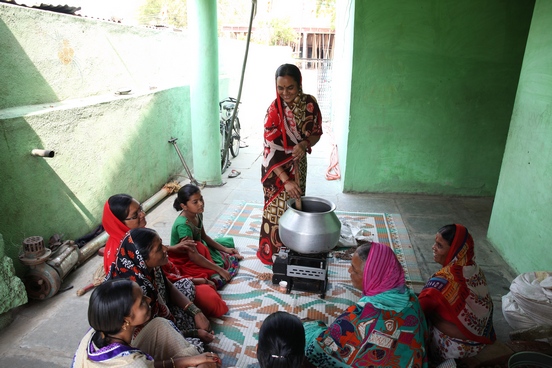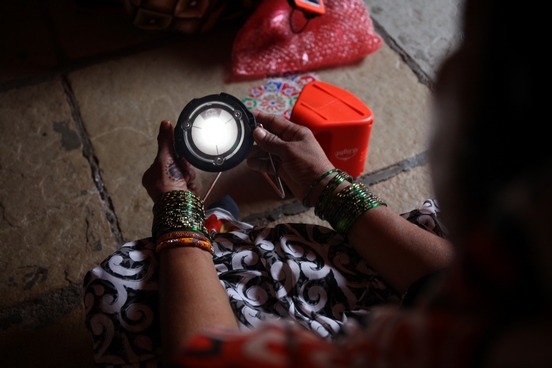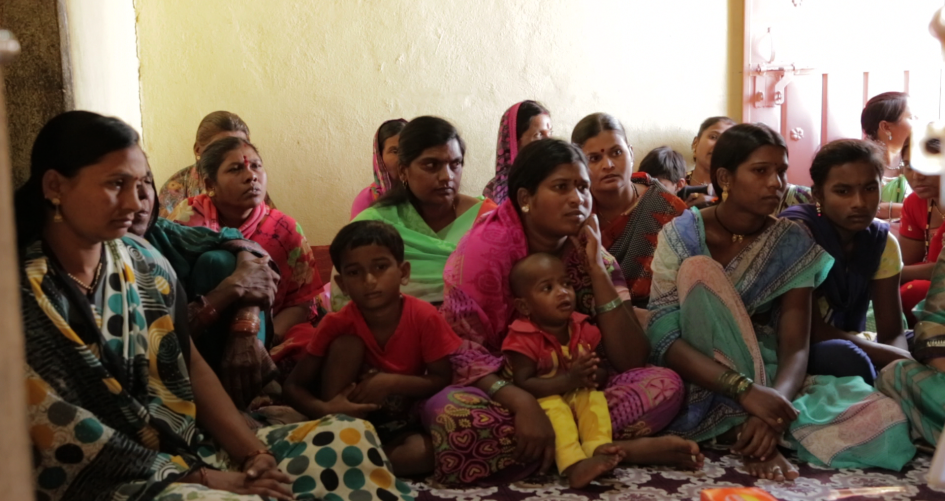Most rural households in India rely on polluting energy sources like firewood and kerosene for their daily cooking and lighting needs. Women and children dependent on firewood are exposed to indoor pollution and its harmful health effects. Because women in rural India shoulder the responsibility of ensuring the well-being of their families, they play a pivotal role in household decisions related to choice of fuel and technology.
Swayam Shikshan Prayog, an Indian NGO, trains rural women in entrepreneurship and builds their capacities for marketing clean-energy projects in their communities. Currently, an active network of 1,100 women entrepreneurs is working across 8 districts in India. The women provide a complete ‘ecosystem’ approach as clean-technology users, educators, providers and supporters in their communities, which helps make it easier for people to adopt energy-efficient technologies and products that address climate change.
Key facts
- Since 2009, Swayam Shishan Prayog has enabled more than 60,000 rural women entrepreneurs to start businesses in high-social-impact sectors such as clean energy, sustainable agriculture, health and nutrition and safe water and sanitation at the grassroots level.
- The project has reached more than 4 million people across 4 states in India.
- More than 1,000 women entrepreneurs have been trained on clean-energy technologies and have now started businesses.
The problem
Women and children spend hours seeking out fuel for cooking, while the burning of kerosene and wood releases greenhouse gases that contribute to global warming and cause lethal indoor air pollution.
The World Health Organisation estimated a total of 7 million deaths worldwide in 2012 were caused by exposure to air pollution – one in eight of all global deaths. Indoor air pollution was linked to 4.3 million of the deaths that occurred in homes which depend on biomass or coal for cooking.

The solution
Swayam Shishan Prayog (SSP) empowers women by enabling them to emerge as clean energy entrepreneurs and climate change leaders in their rural communities. SSP preliminary operates across 14 districts across 4 states in India namely Maharashtra, Bihar, Gujarat and Tamil Nadu.
As village-level entrepreneurs, women are involved in propagating clean and green practices in sustainable agriculture, protecting natural resources and adopting renewable energy solutions.
Core to SSP’s approach is the empowerment of women and girls through the creation of a holistic grassroots entrepreneurship support ecosystem, which builds capacities through fostering entrepreneurship and vocational skills development, providing seed and business expansion loans, facilitating rural marketing and distribution linkages and enabling access to a peer network of grassroots entrepreneurs who grow and learn with each other.
Helping the planet
The project’s women entrepreneurs make clean energy products accessible to people living in their communities, which helps cut greenhouse gas emissions. Their efforts, for example, have resulted in more than 100,000 women and households using clean cook stoves, which save almost 100 tonnes of firewood per day. Similarly, promotion of solar lanterns, biogas cooking units, organic farming, vermin-composting and efficient irrigation technology has been part of SSP’s efforts to address climate change.

Helping people
The women entrepreneurs trained by the project have placed the issue of clean energy at the centre of community development by motivating and converting all households in the village into clean-energy users. Once the communities become motivated and adopt clean energy technologies, they begin to transform their villages from non-users to adopters and promoters of clean energy.
The women act as change makers both within their households and in their communities. Building their professional skills enables them to conduct their businesses more efficiently. Strengthening their position as entrepreneurs and organizing them as a network opens up avenues for diffusion of their innovations.
Over the years women entrepreneurs in SSP’s network have gone beyond entrepreneurship and economic empowerment to embracing community leadership roles. They are now supporting rural communities to take constructive steps to improve the quality of environment, adopt clean energy products and services, recharge community water sources and promote agricultural best practices in order to improve their long-term resilience to climate change.
Spillover effect
The project is based on a market-based approach and can be can adapted anywhere. Large companies can take their clean energy products into rural markets. The need for clean energy products is widespread and women can be engaged as entrepreneurs, making it a sustainable solution in India and elsewhere.
SSP has been collaborating with USAID over the last three years under the wPOWER programme to expand the rural women entrepreneurship network to more than 1,000 women entrepreneurs, reaching 10 million rural households across 6 districts of Maharashtra and 2 districts of Bihar. Currently SSP is partnering with Misereor, the German Catholic Bishops’ Organisation for Development Cooperation, to expand the rural clean energy network to 2 additional districts in Bihar.




Images owned by the activity partners, all rights reserved.

